AMD Zen 3 Ryzen Deep Dive Review: 5950X, 5900X, 5800X and 5600X Tested
by Dr. Ian Cutress on November 5, 2020 9:01 AM ESTCPU Tests: Synthetic
Most of the people in our industry have a love/hate relationship when it comes to synthetic tests. On the one hand, they’re often good for quick summaries of performance and are easy to use, but most of the time the tests aren’t related to any real software. Synthetic tests are often very good at burrowing down to a specific set of instructions and maximizing the performance out of those. Due to requests from a number of our readers, we have the following synthetic tests.
Linux OpenSSL Speed: SHA256
One of our readers reached out in early 2020 and stated that he was interested in looking at OpenSSL hashing rates in Linux. Luckily OpenSSL in Linux has a function called ‘speed’ that allows the user to determine how fast the system is for any given hashing algorithm, as well as signing and verifying messages.
OpenSSL offers a lot of algorithms to choose from, and based on a quick Twitter poll, we narrowed it down to the following:
- rsa2048 sign and rsa2048 verify
- sha256 at 8K block size
- md5 at 8K block size
For each of these tests, we run them in single thread and multithreaded mode. All the graphs are in our benchmark database, Bench, and we use the sha256 and md5 results in published reviews.
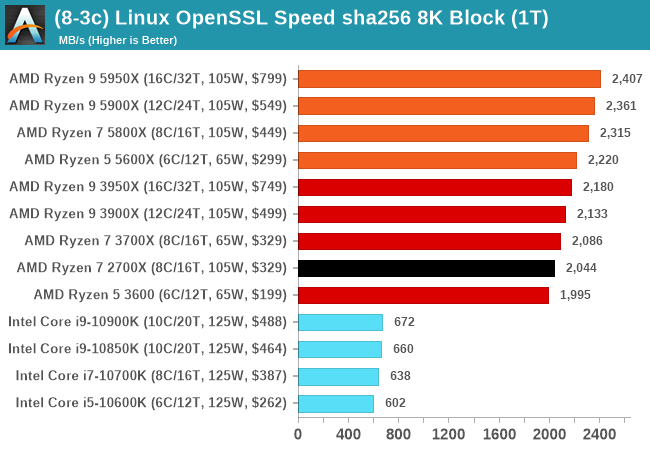
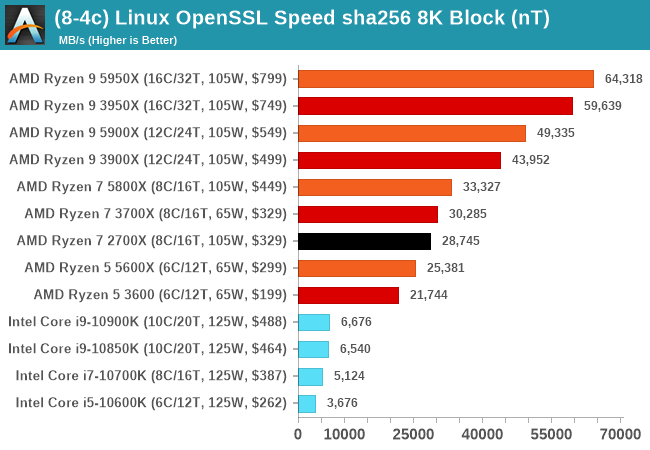
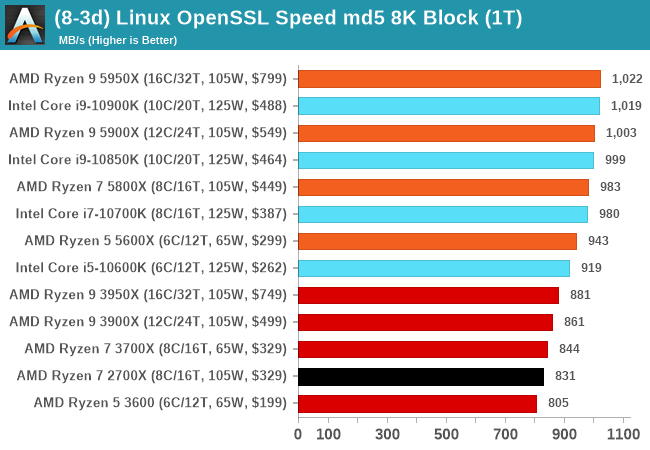
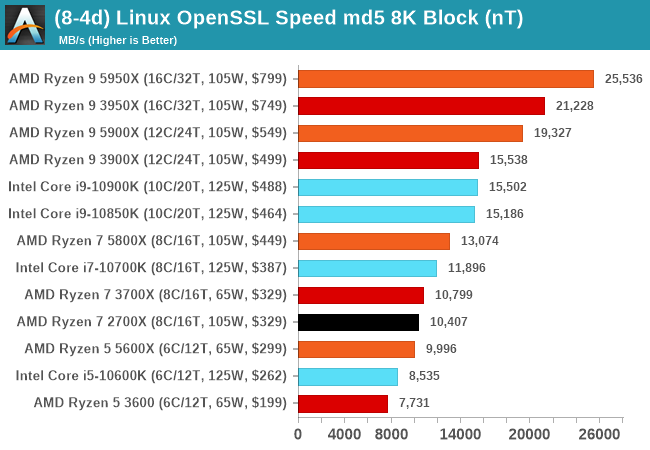
GeekBench 5: Link
As a common tool for cross-platform testing between mobile, PC, and Mac, GeekBench is an ultimate exercise in synthetic testing across a range of algorithms looking for peak throughput. Tests include encryption, compression, fast Fourier transform, memory operations, n-body physics, matrix operations, histogram manipulation, and HTML parsing.
I’m including this test due to popular demand, although the results do come across as overly synthetic, and a lot of users often put a lot of weight behind the test due to the fact that it is compiled across different platforms (although with different compilers).
We have both GB5 and GB4 results in our benchmark database. GB5 was introduced to our test suite after already having tested ~25 CPUs, and so the results are a little sporadic by comparison. These spots will be filled in when we retest any of the CPUs.
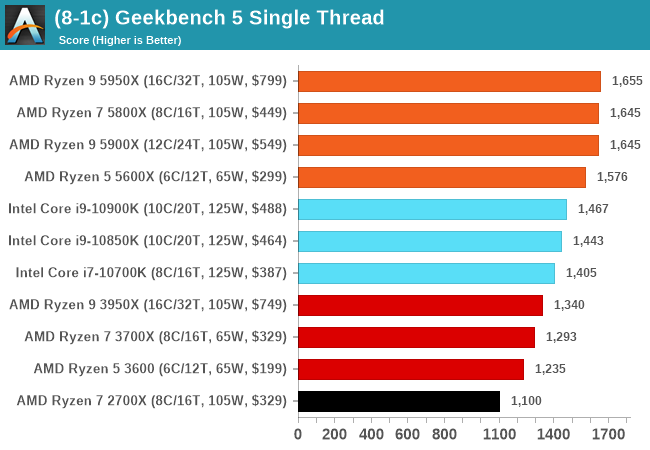
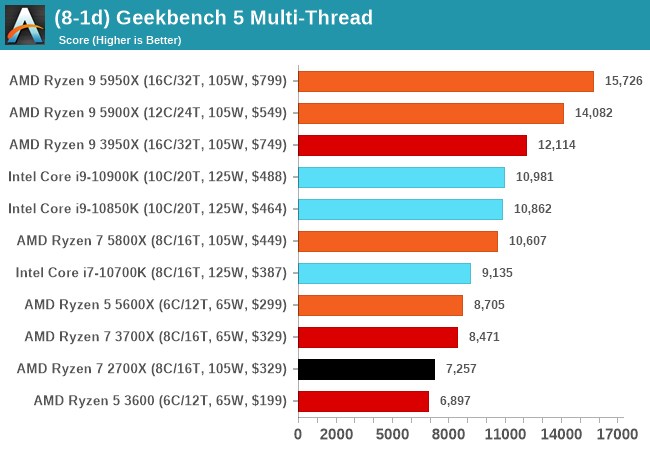










339 Comments
View All Comments
jakky567 - Tuesday, November 24, 2020 - link
Total system, I think the 5950x should be more popular. That being said, the 5900x is still great.mdriftmeyer - Monday, November 9, 2020 - link
I spend $100 or more per week on extra necessities from Costco. Your price hike concerns are laughable.bananaforscale - Monday, November 9, 2020 - link
5900X has good binning and the cheapest price per core. For productivity 3900X has *nothing* on 5900X for the 10% price difference and 5950X is disproportionately more expensive. Zen and Zen+ are not an option if you want high IPC, 3300X basically doesn't exist... I'll give you that 3600 makes more sense to most people than 5600X, it's not that much faster.Kangal - Wednesday, November 11, 2020 - link
"Price per Core".... yeah, that's a pointless metric.What you need to focus on is "Price per Performance", and this should be divided into two segments: Gaming Performance, Productivity Performance. You shouldn't be running productivity tools whilst gaming for plenty of reasons (game crashes, tool errors, attention span, etc etc). The best use case for a "mixed/hybrid" would be Twitch Gaming, that's still a niche case.... but that's where the 5800X and 5900X makes sense.
Now, I don't know what productivity programs you would use, nor would I know which games you would play, or if you plan on becoming a twitcher. So for your personal needs, you would have to figure that out yourself. Things like memory configurations and storage can have big impacts on productivity. Whereas for Gaming the biggest factor is which GPU you use.
What I'm grasping at is the differences should/will decrease for most real-world scenarios, as there is something known as GPU scaling and being limited or having bottlenecks. For instance, RTX 2070-Super owners would target 1440p, and not 1080p. Or RTX 3090 owners would target 4K, and not for 1440p. And GTX 1650 owners would target 1080p, they wouldn't strive for 4K or 1440p.
For instance, if you combine a 5600X with a Ultra-1440p-card, and compare the performance to a 3600X, the differences will diminish significantly. And at Ultra/4K both would be entirely GPU limited, so no difference. So if you compare a 5800X to a 3900X, the 3900X would come cheaper/same price but offer notably better productivity performance. And when it comes to gaming they would be equal/very similar when you're (most likely) GPU limited. That scenario applies to most consumers. However, there are outliers or niche people, who want to use a RTX 3090 to run CS GO at 1080p-Low Settings so they can get the maximum frames possible. This article alludes to what I have mentioned. But for more details, I would recommend people watch HardwareUnboxed video from YouTube, and see Steve's tests and hear his conclusions.
Whereas here is my recommendation for the smart buyer, do not buy the 5600X or 5800X or 5900X. Wait a couple months and buy then. For Pure Gaming, get the r5-5600 which should have similar gaming performance but come in at around USD $220. For Productivity, get the r7-5700 which should have similar performance to the 5800X but come in at around USD $360. For the absolute best performance, buy the r9-5950x now don't wait. And what about Twitch Streamers? Well, if you're serious then build one Gaming PC, and a second Streaming PC, as this would allow your game to run fast, and your stream to flow fluidly.... IF YOU HAVE A GOOD INTERNET CONNECTION (Latency, Upload, Download).
lwatcdr - Monday, November 9, 2020 - link
"You can get the 3700 for much cheaper than the 5800X. Or for the same price you can get the 3900X instead."And if you want both gaming and productivity? They get the 5800X or 5900X. So AMD has something for every segment which is great.
TheinsanegamerN - Thursday, November 12, 2020 - link
The 5900x is margin of error from the 5950x in games, still shows a small uptick in gaming compared to 5800/5600x, offers far better performance then 5600/5800x in productivity tasks, and is noticeably cheaper then the 5950x.How on earth is that a non buy?
The rest may be better value for money, but by that metric a $2 pentium D 945 is still far better value for money depending on the task. The 5000 series consistently outperforms the 3000 series, offring 20% better performance for 10% better cash.
Kishoreshack - Saturday, November 14, 2020 - link
AMD has the best products to offerSoo you expect them to sell it at a cheaper rate than intel ?
Threska - Monday, November 16, 2020 - link
AMD has a good product RANGE, which means something for everyone AND all monies go to AMD regardless of consumer choice.Ninjawithagun - Friday, November 20, 2020 - link
The price hike is mainly to cover ongoing R&D for the next-gen Ryzen Zen 4 CPUs due out in 2022. The race between Intel and AMD must go on!jakky567 - Monday, November 23, 2020 - link
I disagree about the 5900x being a no buy.I feel like it goes 5950x for absolute performance. 5900x for high tier performance on a budget. And then the 3000 series for people on a budget, except the 3950x.
The 5900x has all the l3 cache.